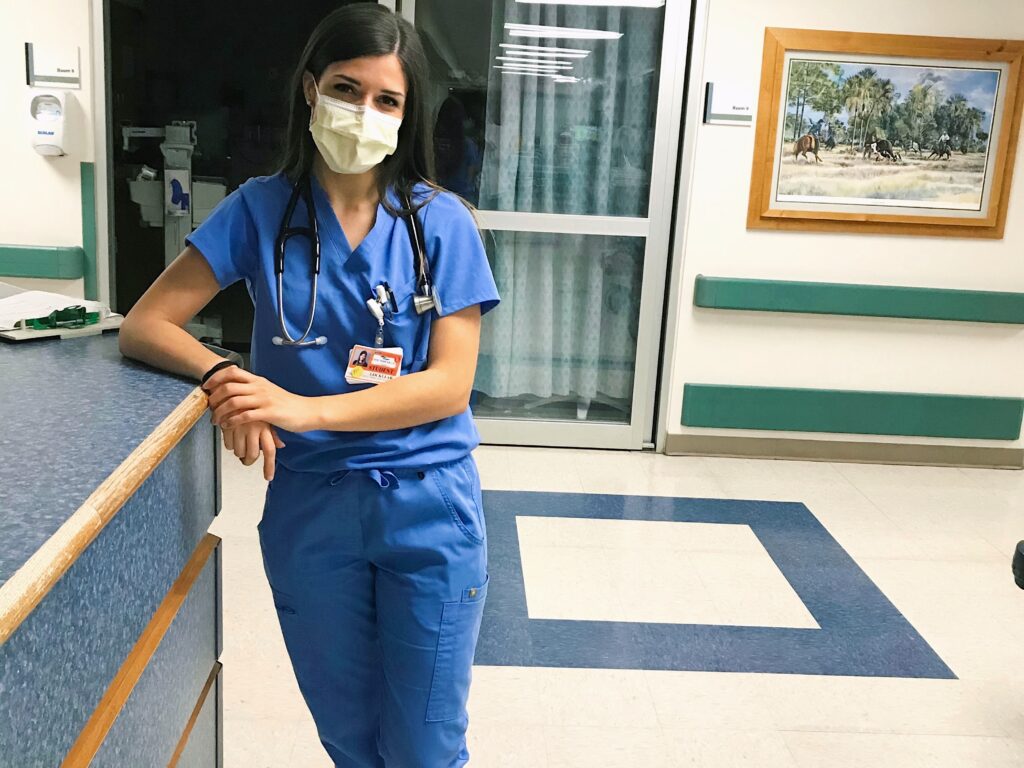Medical Students Help Physicians Understand Changing COVID-19 Triage and EMTALA Protocols

Taylor Locklear, OMS-III
Like all aspects of life and learning, medical education has changed due to the impact of COVID-19. Student Doctor Taylor Locklear and six other medical students participated in a special project in the early stages of the crisis in mid-March “Triage/EMTALA and Telehealth changing CMS and State Rules” at the clinical campus at Cape Fear Valley Health in Fayetteville, NC.
“They did a wonderful job and make CFV and CUSOM proud. IT has been a herculean effort to keep up with all of the regulatory changes. They did this wholeheartedly and with a great attitude. One simple request by our GME office, and they listened and produced a fabulous education guide!” – Dr. Don Maharty, regional associate dean.
Student Doctor Locklear went home to Florida when Campbell’s MS-III curriculum transitioned online in March. Her mother is a flight nurse and her step-father is an EMS chief officer. Before she left NC, her parents told her the hospital in her hometown has been extremely short staffed during the COVID-19 crisis, so she decided to volunteer in the ED. “Luckily I’m from a small town and the hospital hasn’t been hit hard with COVID-19 cases throughout this pandemic.”

What was the project?
Our regional associate dean, Dr. Don Maharty, and Kristen Wilkey, Surgery Residency Program Administrator, reached out to the medical students at Cape Fear Valley Health with a project to help guide triage during the COVID-19 National Emergency. During this crisis, the CMS and EMTALA guidelines are being updated daily. We were tasked with the responsibility to research and create a presentation regarding current regulations and requirements necessary to allow offsite screening and testing for COVID-19. Implementing telehealth visits and testing patients remotely reduces the number of patients needing hospitalization and helps prevent the hospitals from becoming overwhelmed. The goal of this project was to aid in the implementation of the telehealth process.
The seven MS-III/MS-IV students who contributed to the project – Mere Culbertson, John Masoud, Taylor Parisse, Taylor Renbarger, Krisos Spyratos, Harsh Terala and I – all have an interest in Emergency Medicine. The project was a great way for us to get involved and learn more about the EMTALA regulations, and, more importantly, help in any way we could during the COVID-19 crisis. I think the frustrations many of us are experiencing right now come from a feeling of helplessness. I know I can speak for all medical students when I say we went into the medical field because of our desire to help and serve others. It’s hard to sit at home when you want to be on the front line, but this was an easy way to get involved and do our part.
Honestly, I’m extremely proud of the group’s work. We came together as a group and were able to get this project completed in a matter of a few days.
What have the changes been like for you as students?

There’s a sense of uncertainty felt by the student body as a whole right now. At Cape Fear Valley, we were pulled from rotations in mid-March. As the situation progressed, we seemed to know rotations would be cancelled, but were unsure of how this would affect our clinical requirements and education. Our VCOM colleagues expressed their concerns for the Level 2 PE – as their curriculum dictates they take the exam in the Spring of 3rd year. One student was required to cancel a week prior to her examination.
As third years, we’re currently applying for away rotations. Some programs have temporarily halted the application process due to this outbreak. While we have our concerns as third year medical students, we have been able to see how the fourth-year students have kept a positive attitude and made lemonade out of lemons. This has helped put it into perspective for many of us. Despite having Match Day cancelled, they’ve maintained a positive attitude. Two fourth years involved in the project – Taylor Renbarger and Krisos Spyratos – are perfect examples. Rather than complaining, they stepped up and dedicated their free time to completing this project.
Campbell has been quick to calm many of our fears. Despite the unknowns, CUSOM administration was quick to implement an alternative syllabus consisting of modules, case studies, and other online education activities to allow us to meet COCA accreditation requirements necessary for our rotations. Many preceptors and Clinical Chairs have scheduled regular conferences calls with students.
We know this is uncharted territory on a national level. I’d like to commend Dr. Jim Powers on his leadership and devotion to us students during this time. He has kept us informed throughout this entire process and ensured our safety. Though many unanswered questions remain, we know CUSOM is working hard to make sure we’re safe and prepared in our future.
